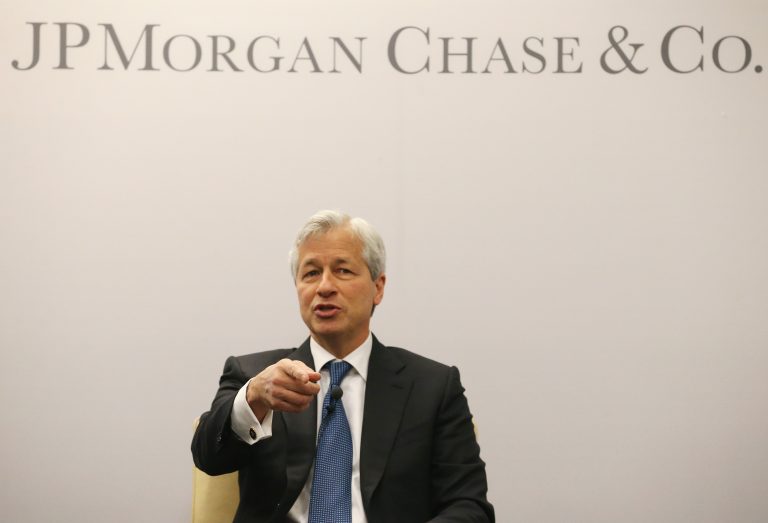
JPMorgan Chase CEO Jamie Dimon has warned that the sweeping tariff measures introduced by President Donald Trump will likely trigger inflation and further slow down an already weakening U.S. economy.
In his annual shareholder letter released Monday, Dimon struck a cautionary tone, outlining several economic risks he believes are converging at a time of increasing global instability.
The remarks mark the first time a major Wall Street CEO is publicly weighing in on Trump’s April 2 tariff announcement, which sent global financial markets into a tailspin, triggering the worst week for U.S. equities since the early days of the Covid-19 pandemic.
Register for Tekedia Mini-MBA edition 19 (Feb 9 – May 2, 2026).
Register for Tekedia AI in Business Masterclass.
Join Tekedia Capital Syndicate and co-invest in great global startups.
Register for Tekedia AI Lab.
“Whatever you think of the legitimate reasons for the newly announced tariffs – and, of course, there are some – or the long-term effect, good or bad, there are likely to be important short-term effects,” Dimon wrote. “We are likely to see inflationary outcomes, not only on imported goods but on domestic prices, as input costs rise and demand increases on domestic products.”
He cautioned that while it remains to be seen whether the tariff package will cause a full-blown recession, it will certainly act as a drag on growth.
Dimon’s tone marks a notable shift from his position in January when he dismissed tariff concerns, saying they were justified for national security. At the time, discussions were centered around far milder tariff levels. Trump’s latest round of tariffs, which cover hundreds of billions of dollars in goods, appears to have caught markets and business leaders off guard.
“The quicker this issue is resolved, the better,” Dimon said, adding that prolonged uncertainty would make the economic impact harder to reverse. “In the short run, I see this as one large additional straw on the camel’s back.”
The 69-year-old banker said the U.S. economy had already begun to weaken in recent weeks, even before the tariff bombshell. Fueled by nearly $11 trillion in government borrowing and pandemic-era spending, the American economy had managed to stay buoyant, but the momentum is now showing cracks.
Inflation, he said, is proving more stubborn than many have assumed, and this could keep interest rates elevated even as growth falters, a scenario few investors appear to be pricing in.
“Markets still seem to be pricing assets with the assumption that we will continue to have a fairly soft landing,” Dimon warned. “I am not so sure.”
Quiet Critique of Trump’s Approach
Though Dimon’s 59-page letter never mentions Trump by name, the subtext was unmistakable. He appeared to support the idea of addressing trade imbalances and the need for stronger immigration policy, two pillars of Trump’s economic platform but challenged the president’s method of reshaping the global order.
Instead of retreating into protectionism, Dimon made a case for deepening America’s role in the global system it helped build after World War II, a system he says has underpinned decades of global peace and prosperity.
“If given the opportunity, that is exactly what our adversaries want to happen: Tear asunder the extensive military and economic alliances that America and its allies have forged,” he said. “In the multipolar world that follows, it will be every nation for itself – giving our adversaries the opportunity to set the rules.”
He also warned that global capital flows, the strength of the U.S. dollar, and corporate profits could all be impacted as countries respond to Washington’s increasingly unilateral approach to trade.
Stark Prescription for American Renewal
Dimon’s shareholder letter often serves as a state-of-the-nation essay as much as a bank report, and this year’s version is no different. He painted a picture of a country at a “critical crossroads,” simultaneously juggling high asset prices, sticky inflation, large fiscal deficits, geopolitical tension, and market volatility.
Still, he struck a note of patriotism, arguing that the challenges facing the United States can be met with pragmatic reform, not isolation. He emphasized restoring civic pride, maintaining a strong military “at whatever cost,” and tackling issues like immigration and trade with “common sense.”
“Economics is the longtime glue, and America First is fine,” Dimon said, “as long as it doesn’t end up being America alone.”
A Nervous Market Watches Closely
Under Dimon’s leadership, JPMorgan has become the country’s largest bank by assets and market value, and 2024 marked its seventh straight year of record revenue. But the tone of this year’s letter stands in contrast to previous years, with the CEO sounding less certain about the durability of the American growth story.
His concerns land at a time when investors, already rattled by rising borrowing costs and signs of weakness in the labor market, are bracing for what comes next. Dimon, known for his prescient warnings, including before the 2008 crisis, is once again telling markets not to underestimate the risks.
Whether the White House intends to make any revisions to its tariff plan remains unclear. But with Dimon adding his voice to the growing list of business leaders expressing concern, pressure is mounting on the administration to make amends before more damage is done.



